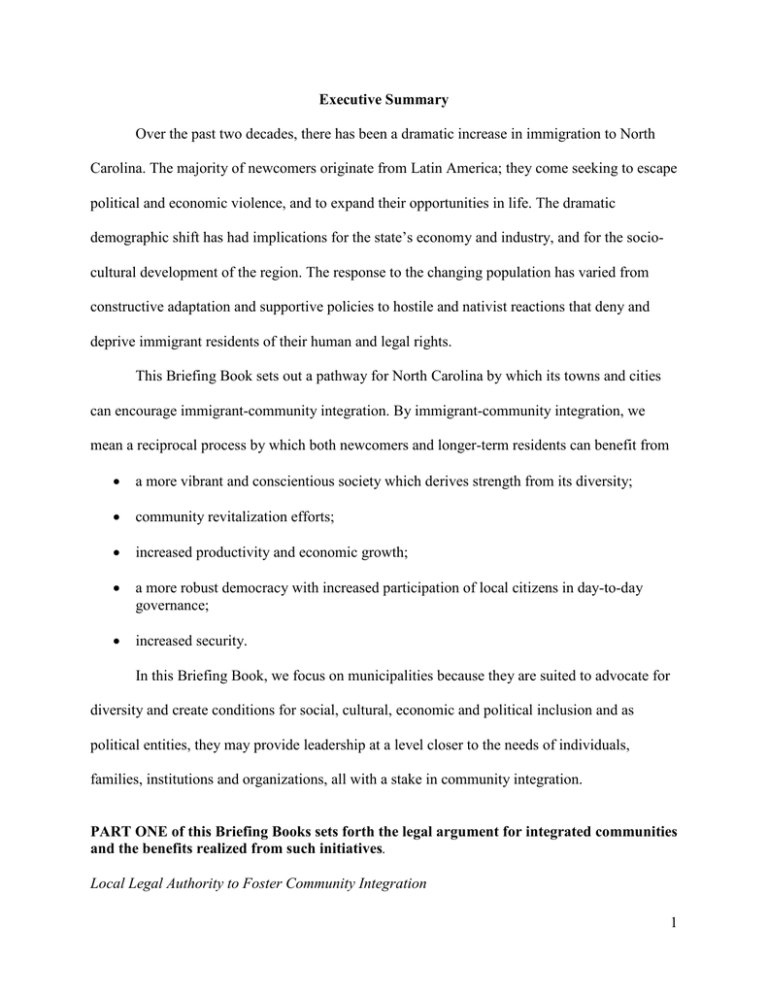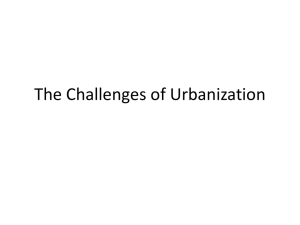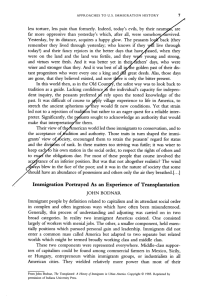Over the past two decades, there has been a dramatic... Carolina. The majority of newcomers originate from Latin America; they... Executive Summary
advertisement

Executive Summary Over the past two decades, there has been a dramatic increase in immigration to North Carolina. The majority of newcomers originate from Latin America; they come seeking to escape political and economic violence, and to expand their opportunities in life. The dramatic demographic shift has had implications for the state’s economy and industry, and for the sociocultural development of the region. The response to the changing population has varied from constructive adaptation and supportive policies to hostile and nativist reactions that deny and deprive immigrant residents of their human and legal rights. This Briefing Book sets out a pathway for North Carolina by which its towns and cities can encourage immigrant-community integration. By immigrant-community integration, we mean a reciprocal process by which both newcomers and longer-term residents can benefit from • a more vibrant and conscientious society which derives strength from its diversity; • community revitalization efforts; • increased productivity and economic growth; • a more robust democracy with increased participation of local citizens in day-to-day governance; • increased security. In this Briefing Book, we focus on municipalities because they are suited to advocate for diversity and create conditions for social, cultural, economic and political inclusion and as political entities, they may provide leadership at a level closer to the needs of individuals, families, institutions and organizations, all with a stake in community integration. PART ONE of this Briefing Books sets forth the legal argument for integrated communities and the benefits realized from such initiatives. Local Legal Authority to Foster Community Integration 1 • Whether North Carolina is defined as a Dillon Rule or Home Rule state, municipalities can utilize existing North Carolina statutes, case law, and state constitutional principles to initiate local community integration efforts. Under North Carolina’s current interpretation of municipal authority, municipalities have broad flexibility to foster community integration. • Federal constitutional principles provide the legal basis for municipal community integration initiatives. Under the U.S. Constitution and decisions by the Supreme Court, certain rights should apply to all human beings, regardless of their citizenship status. • International human rights principles that bind the United States, North Carolina, and its political subdivisions obligate localities to protect immigrants, defend their rights, and integrate them into the communities where they reside. Every person within the United States, regardless of their status, should be afforded fundamental human rights. Local governments should follow these principles as guides, in addition to the federal and state constitutions and their own municipal charters, to assure immigrants are afforded all of the protections accorded under these bodies of law. • Model local ordinances have been used to foster immigrant integration, including municipal identification initiatives which can be used for identification purposes, and can also serve to ensure that all city residents have access to public services and facilities, allow residents to list health conditions and allergies, and serve as identification to allow residents to open bank accounts. Other municipal initiatives have limited local enforcement of immigration laws. These ordinances include prohibiting city employees from inquiring into immigration status, prohibiting racial profiling by law enforcement, and limiting the enforcement of civil immigration laws. • Local governments have legal authority to establish mayoral advisory boards or immigrant affairs offices to foster community integration. These advisory offices or commissions can help to inform local governments of the specific challenges immigrants currently face in their communities and help local authorities to address these needs. Benefits of Integrated Communities There are a number of myths regarding immigrants and their impact on communities: • Most immigrants are undocumented aliens. • Most immigrants receive social welfare benefits. • Most immigrants do not pay taxes. • Immigrants bring crimes to our communities. • Immigrants take away jobs from U.S. citizens. 2 In actuality, immigrants play a vital in our society, and data demonstrates they serve as a positive influence on the national and local economies. Immigrants will sometimes take jobs that U.S. citizens do not want or for which U.S. citizens do not qualify. Immigrants pay taxes and support welfare programs, but they often do not qualify as benefit recipients. In the United States and North Carolina specifically, immigrants are generally law-abiding citizens. Part TWO of this Briefing Book applies the legal concepts developed in Part ONE to the circumstances of day laborers in North Carolina. It chronicles the challenges faced by day laborers in the Chapel Hill and Carrboro communities, and provides a comprehensive policy and legal analysis of potential solutions to these problems. Day Laborers Day laborers solicit temporary employment at formal and informal hiring sites, where they negotiate with employers over employment terms. Day laborers face a number of hardships, including: • unpredictable and varying income; • exploitation by employers, including wage theft; • workplace abuses, including being denied breaks, forced to work longer hours than agreed upon, and threats or assaults by employers. Defending the Rights of Day Laborers: Challenges and Legal Solutions • Challenging the Carrboro Anti-Lingering Ordinance: In Carrboro, NC a 2007 “antilingering” statute was enacted to prevent day laborers from congregating at a well-known location. The ordinance was unconstitutionally vague in violation of the Due Process Clause of the Fourteenth Amendment because it failed to provide residents with fair notice and failed to establish sufficient standards for police enforcement. The ordinance was also overbroad, as its reach prohibited constitutionally-protected conduct, such as First and Fourteenth Amendment rights. As a result of community efforts, the ordinance has been repealed. Addressing Wage Theft Day laborers are particularly susceptible to wage theft by their employers, and they often will not take action against their employers for a number of reasons. They may be unaware of 3 their rights, have limited English proficiency, fear that their undocumented status will be discovered, or they may worry about the stigma attached to being victimized at their workplace. Civil remedies for wage theft suffered by day laborers include: • minimum wage and overtime standards at the federal level established by the Fair Labor Standards Act (FLSA; • minimum wage and overtime requirements for employers at the state level established by the North Carolina Wage and Hour Act (WHA); • administrative remedies through the U.S. Department of Labor, the N.C. Wage and Hour Bureau, or through Small Claims Court; Civil remedies are problematic at best; workers face numerous obstacles in accessing administrative agencies or courts. Municipalities can help workers to overcome these obstacles so that they may seek remedies for wage theft. Criminal remedies for day laborers are more difficult to pursue; failure to pay wages in violation of the N.C. Wage and Hour laws is not a specified crime although there are criminal penalties for unpaid wages. • Municipalities can explore how to enact local ordinances which would adequately criminalize wage theft and protect day laborers from retaliation. Worker Centers as a remedy for wage theft: • The Immigration Reform and Control Act (IRCA). Worker centers are a viable option to protect day laborers from wage theft. Workers centers do not violate IRCA. • Employers are not required by IRCA to verify worker status in every hiring relationship. • Not-for-profit worker centers are not “employers” and do not “hire,” “refer for a fee,” or “recruit for a fee” within the meaning of IRCA. 4 • There are no affirmative obligations of not-for-profit employment centers under IRCA. • Municipalities are neither “employers” nor “agents of employers” within the meaning of IRCA, and therefore should not be required to verify the employment authorization of day laborers at worker centers within a municipality, even if the municipalities fund such worker centers. • Court decisions have upheld the legality of worker centers for undocumented immigrants: • Municipalities are not harboring undocumented immigrants by encouraging or inducing them to come to, enter, or reside in the United States. • Municipalities are not violating the Welfare Reform Act by using taxpayer funds to finance a worker center. • The federal preemption doctrine does not preempt a municipality from establishing a worker center. • The creation and funding of a worker center does not violate Dillon’s Rule in Virginia. Part THREE of this Briefing Book applies the legal concepts developed in Part ONE to community integration and law enforcement. Community Integration and Local Law Enforcement Local law enforcement plays a vital role in fostering community integration. There are unique challenges for law enforcement when interacting with immigrant communities, including language barriers, lack of trust, and fear of law enforcement. However, there are a number of strategies that can be used to better the relationship between law enforcement and immigrant communities, including: • special units and designated officers for immigrant communities; • diversifying the police force; • cultural training in the police department curriculum; • engaging the immigrant community; • creating policies which encourage community policing; 5 • addressing immigrant concerns about deportation; In addition to the general issues affecting immigrant-law enforcement relations, particular problems arise for immigrant victims of domestic violence and other crimes. U.S. immigration laws designed to punish unlawful presence and marriage-based immigration fraud has resulted in the criminal victimization of the immigrant population. Congress has attempted to address through several pieces of legislation, most importantly the Violence Against Women Act (VAWA) and its subsequent reauthorizations to ameliorate the consequences of immigration processes and immigrant victimization. VAWA’s self-petition process and the U visa were created to encourage immigrants to report crimes and to assist law enforcement in their investigations. In order to better integrate communities and improve relations between immigrants and law enforcement: • • law enforcement agencies must shape their policies to maintain the Congressional intent behind VAWA and the U visa; law enforcement agencies should collaborate with community organizations and legal service providers to enhance the use of VAWA and U visas to encourage immigrant victims to report criminal abuses and to provide humanitarian relief to immigrant victims. 6







